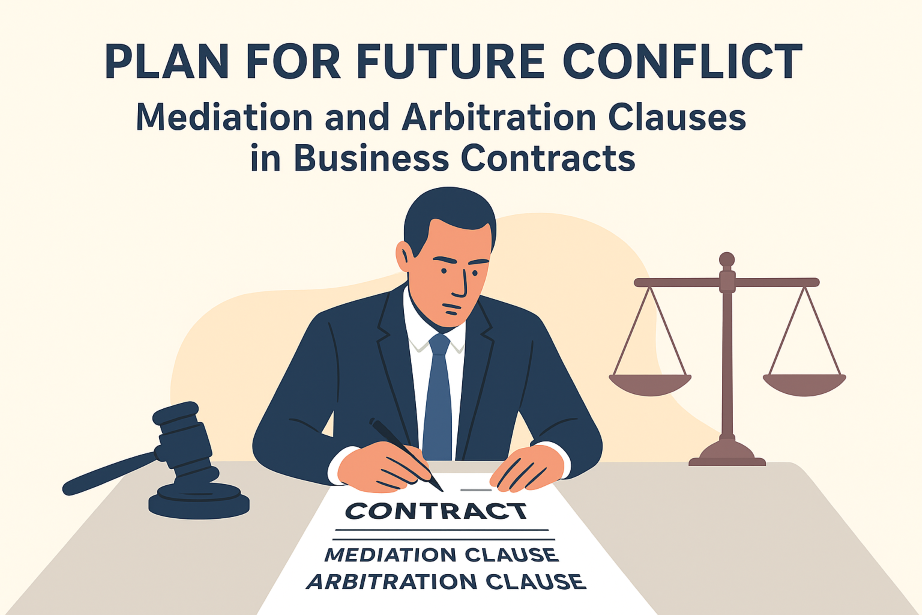Plan for Future Conflict: Mediation and Arbitration Clauses in Business Contracts in Philadelphia

Why Every Business Contract Needs a Dispute Resolution Plan
Running a small business in Philadelphia is rewarding, but it’s not without its challenges. Whether you own a construction company juggling subcontractors, a healthcare practice working with vendors, or a restaurant managing supplier contracts, business-to-business disputes are inevitable. Partnership disagreements, late payments, delivery issues, and unmet expectations happen even when everyone starts with the best intentions. The real question is not if conflict will arise, but how you will handle it.
Planning for conflict is not pessimistic—it’s a smart business strategy. By including clear mediation and arbitration clauses in your Philadelphia business contracts, you can set the rules of the game before a disagreement spirals out of control. The most effective approach is simple:
👉 Mediation first. Arbitration second. Litigation last (if ever).
This structure saves relationships, money, and time while keeping your business focused on growth instead of court battles.
What Are Mediation and Arbitration Clauses in Philadelphia Contracts?
A mediation clause requires parties to meet with a neutral third party—a mediator—before pursuing litigation or arbitration. The mediator doesn’t decide the outcome; instead, they guide the conversation and help the parties find common ground. An arbitration clause goes a step further. If mediation doesn’t resolve the issue, arbitration requires both sides to present their case to a neutral arbitrator (or panel of arbitrators). The decision is binding, meaning it has legal force similar to a court judgment.
How does this differ from traditional litigation?
- Faster: Although Philadelphia Courts are quicker than many, court cases can drag on for years, but mediation and arbitration usually conclude in weeks or months (parties can ultimately choose the timing).
- Private: Unlike public court filings, mediation and arbitration keep business matters confidential.
- Cost-Effective: Legal fees and court costs add up quickly. Alternative dispute resolution (ADR) is often far less expensive depending on the provider you choose.
This is why more Philadelphia small business owners are turning to mediation clauses and arbitration clauses as a standard part of their contracts.
Why Mediation Should Be the First Step in B2B Disputes
Mediation is especially powerful for small business disputes because it:
- Preserves Relationships – If you’re in a dispute with a vendor, supplier, or partner, mediation allows you to repair the relationship rather than destroy it.
- Less Adversarial – Unlike arbitration or litigation, mediation shouldn’t pit one side against the other.
- Faster and Cheaper – A few mediation sessions can resolve a conflict that might otherwise drag on in court for years.
- Encourages Creative Solutions – Courts and arbitrators issue rulings. Mediators help parties develop flexible solutions that can address both the dispute and the relationship’s future.
- Better for the Parties’ Mental Health – The above reasons all lead to better mental health for the parties involved, as having disputes linger without outside help can be exceptionally disruptive.
📌 Example: A Philadelphia food service business faces consistent late deliveries from a vendor, leading to income and business loss. Instead of cutting ties and suing for damages, mediation might result in renegotiated delivery schedules, new quality standards, and even collaborative problem-solving that strengthens the vendor relationship.
When Arbitration Becomes Necessary in Philadelphia
Of course, not every conflict can be resolved through mediation. That’s where arbitration comes in. A business arbitration clause ensures that if mediation fails, both sides still avoid costly, public litigation. Arbitration offers:
- Binding certainty: The arbitrator’s decision is final and enforceable.
- Privacy: Sensitive financial or operational details stay out of the public record.
- Speed: Arbitration can often be resolved in months instead of years.
- Expertise: Arbitrators often have specialized knowledge in industries like construction, healthcare, or professional services.
By having arbitration as the next step, Philadelphia businesses ensure that disputes reach resolution quickly, fairly, and without draining resources.
Drafting Effective Dispute Resolution Clauses
The best time to agree on how disputes will be handled is when everyone is still on good terms. Don’t wait until conflict arises!
When drafting mediation and arbitration clauses for business contracts, consider these elements:
- Mediation First: Require parties to attempt mediation before arbitration.
- Name the Neutral(s): If possible, identify the mediator and arbitrator(s) in advance to avoid disputes later.
- Location: Specify Philadelphia or nearby counties for convenience and enforceability.
- Scope: Apply the clause to all disputes arising under the contract.
- Rules & Procedures: Clarify that you will follow the processes and rules of the chosen neutral(s).
When carefully drafted, these clauses reduce uncertainty, lower costs, and protect long-term relationships.
Why Philadelphia Businesses Should Prioritize Local Mediation and Arbitration
Why keep it local? Because Philadelphia and Delaware Valley mediation services and arbitration professionals bring advantages that national providers often can’t:
- Accessibility: Local neutrals understand Philadelphia’s business culture, legal environment, and industries—from construction and healthcare to startups and professional services.
- Cost Savings: Avoid the expense of flying in out-of-town arbitrators or paying for distant venues.
- Neutral Ground: Choosing a Philadelphia mediator ensures no party feels disadvantaged by geography.
For small businesses that depend on community ties and reputation, local dispute resolution is not just practical—it’s strategic.
Case Example: How a Mediation Clause Saved a Business Relationship
Consider this scenario:
A Philadelphia construction contractor and a materials supplier clash over repeated delivery delays. The contractor considers pulling the plug and suing for damages. Instead, the contract’s mediation clause requires both sides to sit down with a local mediator. Through the process, they renegotiate the delivery schedule, improve communication, and even develop joint quality-control standards.
Result: The relationship is preserved. Both businesses save money and avoid arbitration or litigation.
This example illustrates why mediation should always be the first course of action. It not only solves the immediate issue but can actually strengthen the business relationship.
The Risks of Skipping Mediation and Arbitration Clauses in Philadelphia
What happens if your business contracts don’t include mediation or arbitration clauses?
- Costly Litigation: Court cases mean attorney fees, delays, and long resolution times.
- Loss of Control: Courts decide how the process unfolds, not you.
- Damaged Relationships: Litigation often destroys partnerships, vendor agreements, and goodwill.
- Public Exposure: Court filings are public, which can hurt your reputation.
In short, skipping these clauses is a gamble small businesses can’t afford to take.
Practical Tips for Philadelphia Small Business Owners
Here’s how to protect your business today:
- Review Existing Contracts: Do they already include mediation and arbitration clauses? If not, consider amending them now while no conflicts are active.
- Draft Strong New Clauses: For new agreements, work with a Philadelphia mediator or legal counsel to develop and include the suggested clauses.
- Name Your Neutrals: Consider identifying a trusted mediator or arbitration panel in advance.
- Keep It Fair: Ensure both sides feel the process is neutral and balanced.
- Do It Early: Plan dispute resolution while relationships are positive, not after conflict arises.
These steps help Philadelphia small businesses—whether in construction, food service, healthcare, or startups—stay prepared when disputes inevitably occur.
Conclusion: Protect Your Business Relationships and Bottom Line
Conflict is inevitable in business. But costly, drawn-out litigation doesn’t have to be. By prioritizing mediation first and arbitration second, Philadelphia small business owners can resolve disputes efficiently, protect their relationships, and keep operations running smoothly.
With a strong network of Philadelphia mediators and arbitrators, local businesses have every reason to plan ahead and safeguard their contracts.
👉 If your business contracts don’t include mediation and arbitration protections, now is the time to act. Contact Philadelphia mediator Ari Sliffman at AJS Resolutions to discuss how tailored dispute resolution clauses can protect your business. Already have a conflict that needs your attention? Book your mediation with Ari Sliffman here.
